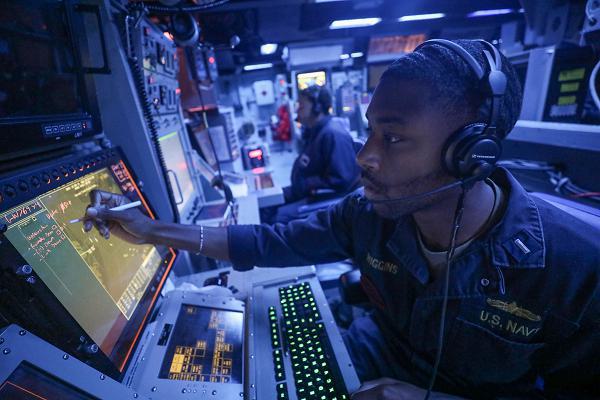
Pacific Ocean. (November 15, 2025): He was one of the very few individuals to be honored by having an entire fleet of Navy ships named for him during his lifetime… but just who was Arleigh Burke? In this photo by Petty Officer 1st Class Greg Johnson, Lieutenant Junior Grade Marcus Wiggins, from Mobile, Alabama, stands watch in the combat information center aboard the Arleigh Burke-class guided-missile destroyer USS Dewey, one of seventy-three destroyers named for the Admiral.
Arleigh Albert Burke was born on October 19, 1901, in Boulder, Colorado and rose to the rank of Admiral after forty-two years in the Navy. During his career, Burke served as Chief of Naval Operations during the Eisenhower and Kennedy administrations and he served honorably in World War II, Korea, and Vietnam.
During World War II, Burke commanded Destroyer Squadron 23, known as the "Little Beavers", that covered the initial landings in Bougainville in November 1943 and fought in 22 other separate engagements. His aggressive philosophy in combat was crystalized by his famous admonition that “the difference between a good officer and a bad one is about ten seconds.” He came to this conclusion having witnessed uncertainty and hesitation by naval commanders that had cost them dearly.
In the Korean War, Burke was named Deputy Chief of Staff to Commander Naval Forces Far East and was later promoted over the heads of many Flag Officers who were his senior to Chief of Naval Operations in 1954. During the Vietnam era, Burke supported Admiral Hyman Rickover in the development of a nuclear-powered submarine force and the concept of submarine-launched ballistic missiles. These efforts led to the Polaris missile program that become the single most effective deterrent to a nuclear attack on the United States.
Burke retired on August 1, 1961 and the Navy named its new class of Aegis-equipped guided missile destroyers in Burke's honor in 1991. The naming a U.S. naval vessel after a living figure was only the fourth time it had been bestowed since 1861. During his long career, Burke received numerous combat awards including the Navy Cross, the Distinguished Service Medal, Legion of Merit, and the Purple Heart.
Arleigh Burke died on January 1, 1996 at 94 years old and is buried at the United States Naval Academy Cemetery, in Annapolis, Maryland.


